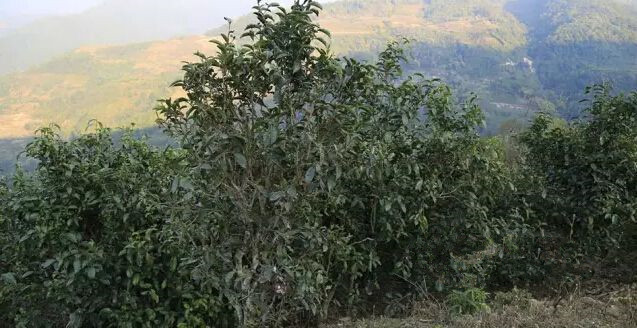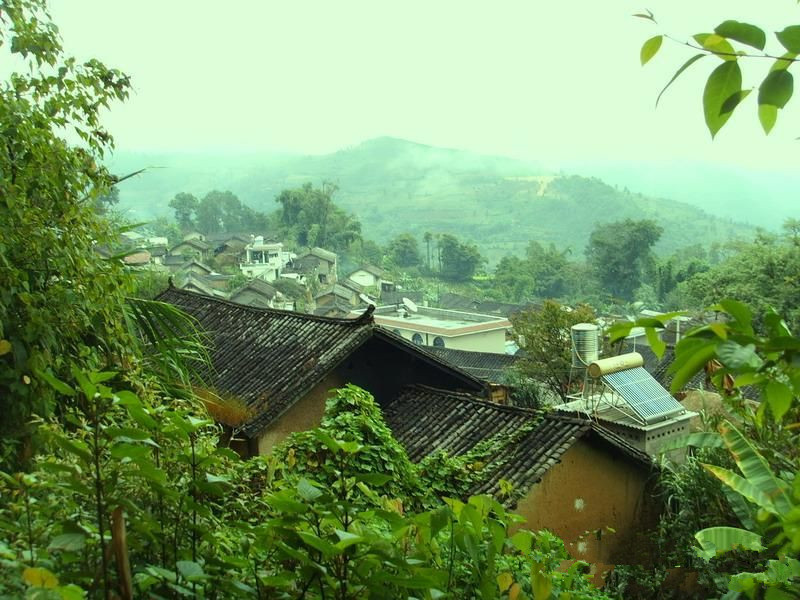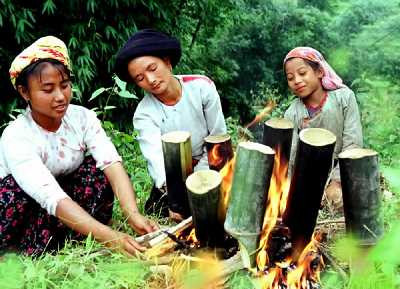Gongnong Village and Tea Plantation of Xibanshan Mountain in Mengku Town, Lincang
Chinese Name: 勐库西半山:公弄大寨
English Name: Gongnong Village of Xibanshan Mountain in Mengku Town, Lincang
Gonglang Village(公弄大寨) is the inhabitant of the Bulang Ethnic People, the oldest village in Mengku, and the place where Gupu people(The ancestors of Tea古濮人) lived.
Gongnong is situated in a small mountain range extending from Bangma Snow Mountain(邦马大雪山) to Mengku, about 12 kilometers away from Mengku Basin. Standing by the Nanmeng River(南勐河) of Mengku Basin, you can see the big green trees of Gonglang Laozhai. Gonglang’s elevation is not the highest in the villages of Mengkuxi Banshan, but Gonglang’s geographical position is good and its vision is wide. Gonglang’s people can see the main peak of Bongma Snow Mountain when they sit at their doorstep.
Gongnong Village is a Bulang ethnic village. Before 1950, it was a famous tea-producing village in Mengku, Shuangjiang. Its tea garden area is at least 2,000 acres above. In 1954 Shuangjiang County Tea Station had already set up some tea collection points in the Gongnong.
Gongnong was listed in the low-yielding tea garden transformation area and the new-style tea garden demonstration area in the 1950s. The ancient tea trees in Gongnong were cut down a lot. At present, few of the 300-year-old ancient tea trees have been preserved. The largest existing tea tree with a circumference of 220 cm can be comparable to the King Tea Tree of Jingmai Mountain(景迈山) in Lancnag County and Nannuoshan Mountain(南糯山) in Menghai County. In spite of this, Gongnong Daye tea has been concerned and valued for half a century, and its varieties have been optimized continuously, which makes Gongnong tea with high popularity and high tea price, and it still sells well.
Chinese Name: 勐库西半山:公弄大寨
English Name: Gongnong Village of Xibanshan Mountain in Mengku Town, Lincang
Overview
- Location: Gongnong Village (公弄大寨) is situated in Mengku Town (勐库镇), Shuangjiang Lahu, Wa, and Blang Autonomous County, Lincang City, Yunnan Province. It is located on a small mountain range extending from Bangma Snow Mountain (邦马大雪山) to Mengku, approximately 12 kilometers from Mengku Basin. The village is positioned by the Nanmeng River (南勐河), offering a view of the large green trees in Gonglang Laozhai.
- Elevation: 1,588 meters above sea level.
- Climate: The average annual temperature is 20°C, with an annual rainfall of 1,750 mm. This climate is favorable for growing tea, walnuts, and other crops.
History and Significance
- Ethnic Group: Gongnong Village is home to the Bulang ethnic group. It is considered the oldest village in Mengku and was historically inhabited by the Gupu people, the ancestors of tea.
- Tea Production: Before 1950, Gongnong was a prominent tea-producing village in Mengku, with a tea garden area of at least 2,000 acres. In 1954, Shuangjiang County Tea Station established tea collection points in Gongnong. However, the village’s ancient tea trees were extensively cut down during the 1950s, and now only a few 300-year-old tea trees remain. Despite this, Gongnong’s tea has continued to be highly regarded and valued for its quality.

Tea Characteristics
- Gongnong Tea: Gongnong’s tea is renowned for its rich history and unique flavor. The ancient tea trees in Gongnong produce tea with a golden-yellow infusion, a sweet taste, and a honey-like fragrance. The tea has a long-lasting aftertaste, rapid salivation, and a deep, rich flavor profile.
Village Features
- Agriculture: Gongnong Village has a total cultivated area of 3,381 acres, including 1,475.5 acres of paddy fields and 1,905.5 acres of dry land. It also has 4,493 acres of forested land. The village has a per capita cultivated area of 1.6 acres.
- Tea Garden: The village is known for its extensive and well-preserved ancient tea gardens, which blend seamlessly with the surrounding forest. Gongnong’s tea is considered to be on par with other renowned tea-producing areas in Mengku, such as Xiaohusai and Sanjia Village.

Unique Aspects of Gongnong
- Tea Culture: Gongnong is celebrated for its tea culture, with a rich history of tea cultivation and consumption. The village has a vibrant tea culture where tea plays a central role in daily life.
- Tourism: Visitors to Gongnong can enjoy the beautiful landscapes of the ancient tea gardens and the surrounding natural environment. The village’s location and historical significance make it an attractive destination for tea enthusiasts and tourists alike.

Summary
Gongnong Village is a historic and culturally rich area known for its ancient tea trees and deep-rooted tea culture. Despite challenges in preserving its old tea trees, Gongnong continues to produce high-quality tea with a unique flavor profile that reflects its heritage and natural surroundings.














